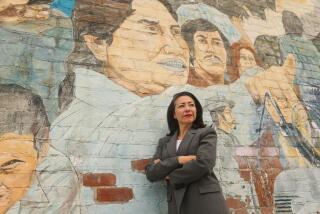Wal-Mart Wages Fight for Suburbs
- Share via
After more than three years of controversy, Wal-Mart celebrated the grand opening Saturday of its Supercenter in Rosemead, amid blaring mariachi trumpets and an air of triumph.
But the political fallout from the battle will culminate today when voters in the predominantly Latino and Asian suburb of 55,000 in the San Gabriel Valley decide whether to recall two council members who back the retail giant.
The specter of the vote loomed over the grand opening: Signs supporting and opposing the recall sprout from lawns leading up to the store. Shoppers walked past banners that read, “No on Recall.” Some customers wore pins that read: “Retain Jay Imperial and Gary Taylor” -- councilmen who voted in support of Wal-Mart.
Wal-Mart Stores Inc. is spending an estimated $300,000 fighting the recall, which has won the support of big labor and several key Democratic Party leaders.
The opening of the store over the weekend is considered something of a milestone for Wal-Mart, which encountered stiff opposition in earlier efforts to build Supercenters in Inglewood and Los Angeles.
It’s the first Supercenter in the Los Angeles Basin -- about 12 miles east of downtown Los Angeles. The only other Supercenters in the county are in Santa Clarita and Palmdale, both nearly 40 miles from downtown.
Labor unions and some lawmakers oppose the store, which combines a regular Wal-Mart with a discount supermarket. Critics argue the giant stores would kill surrounding businesses and depress wages, especially for unionized workers at grocery stores that would be the Supercenter’s main competition.
Three years ago, Rosemead officials rejected these arguments and voted to allow the Supercenter, saying the city needed the estimated $500,000 in annual retail tax revenue the store would bring.
The town has been divided ever since. While Supercenter opponents were unsuccessful in their efforts to block the store, they hope to galvanize opposition elsewhere with the recall, which will be monitored by U.S. Justice Department observers.
A national anti-Wal-Mart campaign -- the “Change Wal-Mart, Change America” bus tour -- made a stop in the city last month for a rally that was attended by numerous Democratic elected officials.
“The recall would be a moral victory at least. It would be something,” said Todd Kunioka, a Rosemead resident and Wal-Mart opponent. “It’s been a sad, discouraging two years.”
But Wal-Mart also sees stakes in the vote and has donated money to back the two incumbents.
“We try to support those council members who are making decisions that are in the best interest of the community,” said Wal-Mart spokesman Kevin McCall. “We are the largest company in the world, the largest private employer, and that makes us a logical scapegoat for a lot of things.”
At one point, Wal-Mart wanted to build 40 Supercenters across California. But so far, the vast majority are located in outlying areas that have been more welcoming than urban areas.
Inglewood voters in 2004 rejected a proposal for a Supercenter, and the Los Angeles City Council that same year established laws that make it much harder for big-box retailers to locate in the city.
So the battles are being waged in suburbs near big cities, such as Rosemead.
Just as supporters of Wal-Mart have been targeted to be ousted from office, the Bentonville, Ark.-based retailer has supported candidates supportive of its plans.
In the small town of Jefferson, Wis., last year, an incumbent critical of Wal-Mart was defeated in a recall election by a challenger with a pro-Wal-Mart platform.
Nu Wexler, a spokesman for Wal-Mart Watch, a Washington, D.C.-based organization largely funded by union and environmental groups, said fights in communities over the Supercenters are increasingly common -- partly because more publicity has been given to the retailer’s business practices.
“These fights take place all over the country,” Wexler said. “They’re nasty and they’re very heated. They involve council meetings that go until 3 a.m. and advertising campaigns that target Wal-Mart opponents.”
Supercenters, which have made Wal-Mart the largest grocery retailer in the United States, now make up more than 2,000 of the company’s 3,800 stores.
“They’re the growth engine in the last decade,” said Nelson Lichtenstein, professor of history at UC Santa Barbara and author of “Wal-Mart: The Face of 21st Century Capitalism.” “One Supercenter can have sales of $150 million a year.”
From Calexico to Contra Costa County, the retailer has successfully fought efforts to keep out the centers.
But Wal-Mart has found the going easier in relatively far-flung suburbs.
In 2004, the Rosemead City Council voted to support Wal-Mart’s plans for a Supercenter in the town.
But in 2005, voters ousted two council members who voted in favor of the store.
“We never had this kind of division before,” Imperial said. “I’ve become a bad guy for some people.... I don’t let it hurt me. I know who I am and what I am, and no matter what they say, they can’t change that.”
Imperial accused labor unions, which have criticized the retailer for low wages and insufficient benefits, with fueling the campaign.
“The biggest thing in my life has been integrity. Integrity is all I’ve used in my 30 years on the council,” Imperial said. “I did what’s best for the people in my city and not just one group.”
The 76-year-old Army veteran said he knew that even if he weathered the recall, his opponents would have another shot at unseating him during the regular election next March.
“I tell you one thing,” Imperial said, “before I let them do what they think they can do to this city, they’re going to have to look at my face for a long time. I don’t give up that easy.”
A court ordered that the election to be monitored by federal observers after Taylor and Imperial complained that recall petitions were only circulated in English in a city where most residents speak a language other than English at home.
Opponents of the Wal-Mart Supercenter said the councilmen deserved to be removed from office for supporting a company that pays low wages and benefits and hurts small businesses.
Larry Bevington, head of Save Our Communities, a group that has spearheaded the anti-Wal-Mart effort in Rosemead, said the group now hoped, among other things, to keep the Wal-Mart from becoming a 24-hour store.
“I think the Wal-Mart issue is a catalyst of division in the city, but I think the council members created the division,” said Councilman John Tran, who was elected last year in part on an anti-Wal-Mart platform. “This is an emotional election ... and I think the recall will pass and their days are numbered.”
During the grand opening over the weekend, most of the talk from a makeshift dais was celebratory and upbeat. But the political divide made its way into the program.
“I’ve never in my life saw anything where there were so many roadblocks,” Taylor told the crowd. “And I’ll tell you, Wal-Mart, I believe, would have been the only corporation that could have survived it.”
*
More to Read
Inside the business of entertainment
The Wide Shot brings you news, analysis and insights on everything from streaming wars to production — and what it all means for the future.
You may occasionally receive promotional content from the Los Angeles Times.









